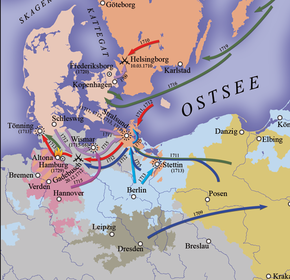Braunschweig Peace Congress
The Braunschweig Peace Congress from 1712 to 1714 were failed peace negotiations under the leadership of Emperor Charles VI. to end the Great Northern War .
prehistory
During this time, the north of the Holy Roman Empire was heavily embroiled in hostilities by the warring powers. Danes , Saxons and Russians fought against the Swedes in Bremen-Verden , Mecklenburg , Holstein-Gottorp , Hamburg and Swedish Pomerania since 1711 . The naval powers Great Britain , the Republic of the Seven United Provinces and the Emperor wanted to prevent the warring states from further devastating their territory by calling a peace congress in Braunschweig .
In addition to the peace treaties of 1713 and 1714, the succession to the throne of the Hanoverian Elector Georg Ludwig in August 1714 in the Kingdom of Great Britain was undoubtedly the most important event in northern Germany . The British-Hanoverian personal union changed the political constellations of Central and Northern Europe . Kurhannover , the strongest politico-military force in northern Germany, now had the political cover of a world power.
course
The permanent place for the negotiations was Braunschweig. In March 1713 the Braunschweig Congress was postponed, to the great annoyance of Charles VI, who had just had to accept the Peace of Utrecht and no longer had any resources free for the conflict in the north. In addition, Prussia got involved in the war by signing the Treaty of Schwedt on October 6, 1713 .
At the end of the same year in 1713, the emperor invited again to a peace congress in Braunschweig. The most important powers, Prussia, Electorate of Hanover and Sweden, stayed away from the congress initiated by the Kaiser in March 1714. Since Sweden demanded the return of all conquered Swedish possessions, the talks failed again in June 1714. The president of the Brunswick Congress of 1714 was Damian Hugo Philipp von Schönborn .
rating
The congress served the Habsburgs primarily as an information exchange with the aim of playing off Prussia and Hanover against each other. The repeated initiatives of Charles VI to unite the opponents of the war for direct talks were unsuccessful. The delegates were only present at times, and the negotiations were repeatedly delayed or interrupted. The congress, however, favored covert negotiations between Kurhannover, Prussia and Denmark.
literature
- Hans Patze: History of Lower Saxony . Ed .: Christine van den Heuvel, Manfred von Boetticher. tape 3 , part 1. Politics, economy and society from the Reformation to the beginning of the 19th century . Hahnsche Buchhandlung, Hildesheim 1998, ISBN 3-7752-5901-5 , p. 233 .
- Johann Stephan Pütter: fruitless congress in Braunschweig . In: Johann Stephan Pütters royal British electoral Braunschweig-Lüneburg secret Justitzraths and full teacher of constitutional law in Göttingen Contributions to German constitutional and princely rights . Second part. Vandenhoeck, Göttingen 1779, OCLC 831610574 , p. 1018 ( books.google.de ).
- Gertrude Staniszewski: The mission of Count Damian Hugo von Schönborn in the Lower Saxony district . Vienna 1963, OCLC 258272957 (dissertation).
- Effects of the Northern War, especially in Holstein, as well as the congress held in Braunschweig for this reason (= NLA WO, 1 Alt 12: Negotiations and contracts from 1714 [including Northern War]. No. 64, Volume 1–3). Lower Saxony State Archives, Wolfenbüttel ( arcinsys.niedersachsen.de ).
Individual evidence
- ^ Carl Ludolf Friedrich Lachmann : History of the City of Braunschweig, from its creation to the end of 1815 , Ludwig Lucius, Braunschweig 1816, p. 247
- ↑ Ludwig Stamer: Damian Hugo Philipp Graf von Schönborn. In: New German Biography (NDB). Volume 3, Duncker & Humblot, Berlin 1957, ISBN 3-428-00184-2 , p. 500 ( digitized version ).

